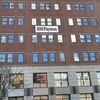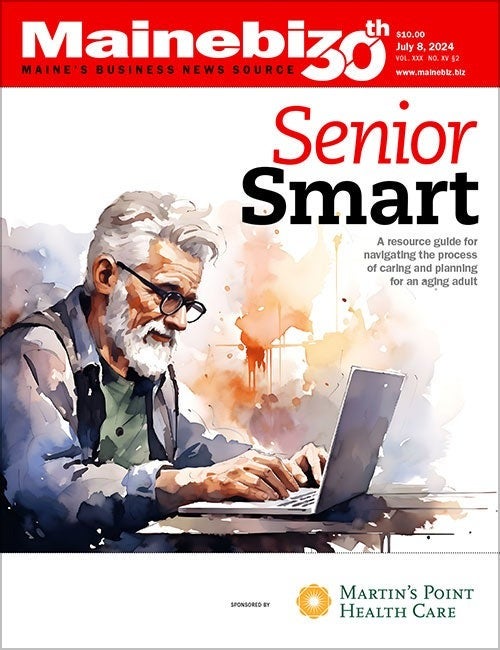From pencil to computer: Lobstermen adapting to digital data collection
 PHOTo / Courtesy Axiom Technologies
Susan Corbett, CEO of broadband provider Axiom Technologies in Machias, is working on an online data collection system for lobster harvesters.
PHOTo / Courtesy Axiom Technologies
Susan Corbett, CEO of broadband provider Axiom Technologies in Machias, is working on an online data collection system for lobster harvesters.
Just 10% of Maine's lobster fishermen, selected randomly each year, are required to report landings and other data to the Department of Marine Resources.
They use good old pen and paper, the forms provided by the DMR.
In this digital age, that seems inefficient, says Susan Corbett, CEO of Axiom Technologies in Machias. In recent years, she and Axiom, a broadband provider, have worked to develop an online data collection system for lobster harvesters.
Now, Corbett has a new program in hand, called MAPOnline, and is seeking partners to further test its effectiveness and implement its distribution.
This project is just one piece of Corbett's Washington County Education and Employment through Sustainable Broadband Adoption Project, funded in 2010 by a $1.4 million federal grant and $445,448 in match funding.
From 2010 to 2012, Corbett's project took advantage of recently installed wireless broadband technology to provide computer and Internet training for three of the county's largest industries — fishing, blueberry farming and health care — and to develop more efficient data collection systems for farmers and fishermen.
Axiom, which already provides rural broadband deployment services, partnered with the Central Maine Medical Center College of Nursing and Health Professions, the University of Maine at Machias, Downeast Community Hospital, Downeast Institute for Applied Marine Research and Education, Sunrise County Blueberry Cooperative and others.
At the time, Corbett's grant application noted only a small percentage of the county's businesses were taking advantage of wireless technology.
In health care, Axiom helped Central Maine Medical Center's nursing college expand its existing distance learning program, adding a remote teaching site for registered nurses at the Downeast Community Hospital. The facility allows folks to obtain a degree without traveling great distances.
The project's other piece recognizes Washington County's position as producer of 90% of the world's wild blueberry crop. The county is also an important center of small- and medium-sized commercial fishing and marine-harvesting operations.
Under Axiom's program, 10 lobster fishermen and 10 blueberry farmers were each given a rugged laptop computer equipped with software to enhance business operations and track data. Corbett says the data collection is a real-time digital program that can meet regulatory reporting requirements.
Isn't this online?
Corbett, recalling a conversation some five years ago, experienced for herself the need for online reporting.
“I have a recreational lobster license, and I was one of those randomly chosen by the DMR,” she says. “I called the DMR and said, 'This must be a mistake. I catch five lobsters, and then I go home and have a glass of wine.'”
When she learned that recreational license-holders are included in the reporting requirement, “I said, 'Isn't this online?' They said, 'No.' I started talking with my fishermen friends: 'What do you think of this?' I pictured 800 traps and doing this data reporting every day by hand.”
Corbett says her friends agreed paper reporting is arduous. Brought into the development process and given tools and training, says Corbett, fishermen were able to say, “This is what we think the software program should look like.”
That led to the development of MAPOnline (maponline.us). The program allows fishermen to keep licenses, vessel registration numbers, landing and dealer numbers in one location, to quickly log trip details and catch information and to log optional details such as weather, bait and fuel usage. It's accessible from a variety of platforms and devices. Records can be stored offline while in the field for later transmission, and are printable for hardcopy storage.
Reporting is a requirement of the Atlantic States Marine Fisheries Commission, an interstate regulatory body that oversees the lobster industry and other fisheries. When mandatory reporting was proposed, in 2007, fishermen fought it, citing concerns the data would reveal secrets of their fishing operations, such as where the best grounds were. Fishermen also feared data would be used as the basis for future quotas on catch while adding one more layer of regulation.
Still, the requirement went into effect in 2008. Since then, according to the landings program, approximately 4,800 harvesters have reported data.
By early 2014, attitudes changed. Some fishermen agreed data collection was useful as one of a suite of tools for tracking fishery and resource trends, particularly in light of news that, while landings are at unprecedented highs, declining larval settlement could indicate a future decline in the resource.
Maine Lobstermen's Association Executive Director Patrice McCarron says harvester reporting these days appears to be an accepted part of operations.
The program requires 10% of harvesters to provide name and license number, boat name and hull ID, date fished, number of crew, gear type, number of traps hauled, set time, total gear in water, depth, statistical area, lobster zone and distance from shore, pounds landed, dealer sold to, port and other information. The program is meant to help track trends in fishing. It requires daily data input, and logs must be sent to the DMR monthly.
Although many of Maine's other fisheries, including Monhegan, require 100% harvester reporting, the DMR has no plans to require reporting from all lobster harvesters.
“The volume of data that comes in from the harvesters now gives the DMR confidence that data is sufficient,” says DMR communications director Jeff Nichols.
Of Axiom's project, Nichols says the DMR “is interested in any opportunities to improve the ease, accuracy and timeliness of reporting. An accurate accounting of both the amount of a resource harvested and the effort that goes into a fishery is critically important to effective resource management.” Toward that end, the DMR this year implemented a dealer electronic reporting system using swipe cards for the elver fishery, and considers that successful.
“For harvesters,” Nichols says, “the department is currently working on a new electronic licensing, enforcement and reporting system that will allow harvesters to report electronically in the future.”
Lobsterman George Dow, who fishes from the Miss Linda out of Bass Harbor, was tapped two years ago by the DMR to participate in the harvester data collection program. He says the program is probably useful. But without digital literacy training, online reporting won't do him any good.
“I don't use the computer,” Dow says. “I'm a No. 2 pencil man.”
The education piece
Similar to fishery reporting, Axiom developed a data collection program with 10 blueberry farmers. Pertinent information includes details such as amounts and locations of harvests, price per pound and pesticide use.
“I had one farmer in his 70s who said, 'Ah, you don't want me, I only type with two fingers.' I said, 'That puts you at the top of the list.'” Recently, she says, the farmer enrolled in a digital literacy class.
Digital literacy education proved essential to the development of these products. Fishing and farming in these remote areas are not traditionally technology-driven, says Corbett.
In keeping with Axiom's concurrent goal to help fishermen and farmers leverage digital tools to enhance their businesses and establish an online presence, both cohorts had opportunities to train in everything from basic “how to use a computer” to Microsoft Office, PhotoShop, QuickBooks, Web Design and a GIS course provided by the University of Maine at Machias. Families and crews were also invited to participate.
By the end of the grant period in 2012, both cohorts, amounting to about 100 people counting families and crews, had achieved about 13,000 learning hours in the digital literacy program.
“That's an amazing amount of dedication,” says Corbett. “The classes were held throughout Washington County, at different times and places, because our subjects were geographically all over the place. When you're looking at barriers to education, if you've got to drive on a dark, icy night in January from Eastport to Machias, you're probably not going to do it. So holding the classes where the people were was essential.”
As a result, Axiom spun off an expanded digital literacy program, receiving a grant from the John T. Gorman Foundation, which enabled the company, in collaboration with the Sunrise County Economic Council, to offer free digital literacy classes in Washington County. The program reached about 1,500 adult learners and more than 200 businesses. Most recently, Axiom spun off the nonprofit Axiom Classroom & Training Center to serve as the adult and community education hub for the county.
“The digital literacy piece opened our eyes to the need for computer education,” Corbett says. In 2012, “I said, 'Why don't we open it up to the public?' The response was phenomenal. As soon as we posted a class, it was immediately filled. So we knew we were onto something.”
Read more










Comments